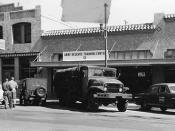According to the Salvation Army, "charity begins at home." The Salvation Army realized that it had a problem with theft among its kettle workers, the people who collect money for the Army during Christmas season. Apparently, some of the kettlers were helping themselves to the Army's money before the organization had a chance to give it out. To put a stop to this problem the Salvation Army along with other business organizations implemented the use of honesty tests for prospective employers, which would aim at flushing out potential troublemakers.
Honesty tests also measure an applicant's tendency toward drug use and violence. All three categories: honesty, drugs, and violence play are key role in companies' losses according to the makers of these tests. A company's loss can be huge when taking into consideration compound problems, such as the cost of employee drug use in terms of absenteeism, lost initiative, inattentiveness, accidents, diminished productivity, and employee violence costs companies millions of dollars in damage, lost productivity and law suites.
Honesty-test makers say that the only way to deal with these problems is before workers are hired, not after. Therefore, prospective employees should be subject to a pre-employment psychological test that will identify those prospective employees who will be likely to steal, who have a history of violence or emotional instability, or who have used illegal drugs in the past on a regular basis. It is believe that dishonest job applicants are clever enough to fool potential employees at a job interview. They have a way of conducting themselves that is probably superior to the low-risk person because they have learned what it takes to be accepted and how to overcome the normal interview strategy. Therefore, the high-risk dishonest person will get the job unless there is someway to screen them,



Honesty
Hehehe I liked this one. Especially the reference to the Sally's (Salvation Army).....another very good job by you. Because this one was slightly humourous I will give it 94% and a.........SMILEY :)
2 out of 4 people found this comment useful.